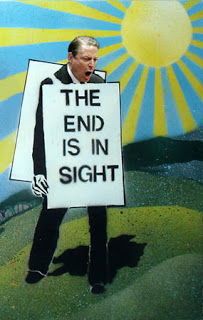 … if all you’re going to do is tell me to stop picking on that nice Al Gore and David Suzuki.
… if all you’re going to do is tell me to stop picking on that nice Al Gore and David Suzuki.
By Lorie Goldstein, Toronto Sun
Today’s column is written as a public service to all my readers who think everything they need to know about global warming they learned from Al Gore’s An Inconvenient Truth and who demand I stop attacking that nice man, David Suzuki. I implore you, I beg you, I beseech, you — STOP READING THIS COLUMN. I can barely keep up with my correspondence from readers who have intelligent things to say. Then there’s you. To all those described above — who don’t understand the difference between weather and climate or how cap-and-trade works, although you always think you do — please, go buy a book on climate change, sit down, read, learn. Then maybe we can have a rational discussion. Look, I’ll help you. Start with Robert Henson’s The Rough Guide to Climate Change: The Symptoms, The Science, The Solutions — the most readable, balanced, and informative book on the subject I’ve come across. Read just the first chapter “The basics — global warming in a nutshell” and, at the end of 40 pages, I promise you, you’ll know more about climate change than 90% of the politicians promising to “fix” it. And don’t worry, Henson’s no “denier.” Even Suzuki would endorse him. After that, read George Monbiot’s Heat: How to Stop The Planet from Burning; The Heat is On: The Climate Crisis, The Cover-up, The Prescription, by Ross Gelbspan; The Weather Makers: How We Are Changing the Climate and What it Means to Life on Earth by Tim Flannery; Stormy Weather, 101 Solutions to Global Climate Change by Guy Dauncey with Patrick Mazza; The Revenge of Gaia: Why the Earth is Fighting Back and How We Can Still Save Humanity by James Lovelock; and a new Canadian book, Carbon Shift: How The Twin Crises of Oil Depletion and Climate Change Will Define the Future, edited by Thomas Homer-Dixon. I encourage skeptics to read these books as well because (a) as some of these authors point out, the energy industry did try to discredit scientific research on global warming — although these days it’s looking for ways to cash in; (b) it was only after reading books like these that I understood why, if the science is right, none of the “solutions” to global warming spouted by our politicians — Kyoto, carbon taxes, cap-and-trade, carbon credits — will work, and (c) reducing our reliance on fossil fuels makes sense to reduce air pollution and increase global security, regardless of global warming. But the problem, if you only read books of this type, is that you don’t come to understand that Kyoto wasn’t an environmental agreement at all, but an economic one, primarily designed to hobble the U.S. economy and that far from lowering global greenhouse gas emissions, it guaranteed they would rise. You don’t understand the irresponsible way Jean Chretien signed Canada onto Kyoto, without realizing the consequences for a big, cold, energy-exporting country with a small population and huge land mass. You don’t understand how a toxic combination of UN bureaucrats, opportunistic politicians, special interests, rent-seekers and scientists-turned-ideologues, has oversold not the reality of anthropogenic climate change, but the certainty about what’s going to happen, where, when, how severe and most important, what we should do. To understand those controversies you need to read books like The Deniers: The World-Renowned Scientists Who Stood up Against Global Warming Hysteria, Political Persecution and Fraud by Lawrence Solomon; Taken by Storm: The Troubled Science, Policy and Politics of Global Warming by Christopher Essex and Ross McKitrick; The Emperor’s New Climate: Debunking the Myths of Global Warming by Bruno Wiskel (these first three books are by Canadians); The Politically Incorrect Guide to Global Warming and Environmentalism, and Red Hot Lies: How Global Warming Alarmists Use Threats, Fraud and Deception To Keep You Misinformed, by Christopher Horner. (Paul Wells’ Right Side Up, The Fall of Paul Martin and the Rise of Stephen Harper’s New Conservatives, while not about climate change, describes the bizarre way Chretien signed us on to Kyoto.) IT’S COMPLICATED Finally read A Moment on the Earth — The Coming Age of Environmental Optimism by Gregg Easterbrook, who, while highly critical of environmental fear-mongering, as opposed to environmentalism, has also come to view global warming as a much more serious threat than when he wrote this thoughtful and authoritative work in 1995. In other words, it’s complicated. So please, go read a book. After all, if global warming poses the immediate, existential threat you say it does, don’t you think you should read at least one !!@#$#$* book on the subject before the apocalypse? Just one? Can’t connect to mysql.
somebody got up on the wrong side of the environmentally safe bed…